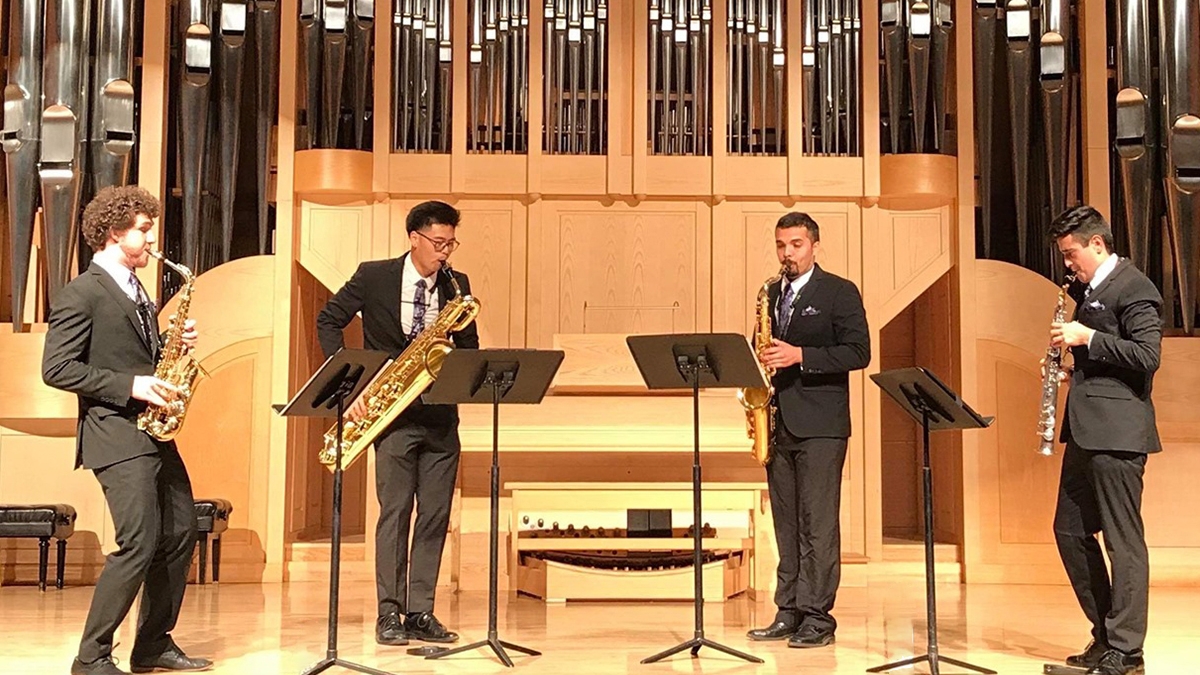ASU saxophone quartet wins top honors in virtual and in-person competitions

ASU saxophone quartet Helíos
ASU saxophone quartet Helíos recently won the silver medal in the senior wind division of the Fischoff Competition, one of the most respected chamber music competitions in the world, held virtually this year due to COVID-19.
Members include School of Music, Dance and Theatre students Matt Fox, Bachelor of Music in performance; Tanner Bayles, Bachelor of Music in composition; Gabe Robles, Master of Music in performance; and Bonson Lee, Master of Music in performance alum and Doctorate of Music in performance beginning in fall.
Of the three competitions the quartet participated in this year, one was held in-person and two transitioned to virtual.
Quartet Helíos finished as a finalist at the virtual Music Teachers National Association Chamber Wind competition in late March and placed third at the North American Saxophone Alliance quartet competition hosted by ASU prior to the pandemic.
Lee said the group chose to participate in the Fischoff competition “because it was one of the biggest competitions for chamber music.”
In large competitions, it is typical for the first competition round to be virtual, with participants submitting audition recordings online. The second round and beyond then becomes in-person, with live performances. This year, Helíos had to adapt to the changing competition world for both in-person and virtual performances.
Christopher Creviston, associate professor in the School of Music, Dance and Theatre and coach of Helíos, said the process for forming quartets is conducted differently at every school. At ASU, the students form their own groups, but he is involved in the decision process.
“The chemistry is the biggest determining factor in the success of the group,” said Creviston. “You could put four amazing players together, but that doesn't always work. If people enjoy each other's company, they will practice and stay together and they will have a strong commitment and work together several hours a week. Helíos is a perfect example — these four amazing players have chemistry.”
Creviston said that because the arts are so subjective, these competitions are about more than the final outcome and winning.
“There are many reasons to participate in competitions, but the idea of winning a competition is not what music or art is about,” said Creviston. “In addition to building notoriety for the student or group, which helps with building a career, preparing for the competition is something that helps students take their art to a higher level. It allows students to not only perfect their playing, but they also learn how to connect with people through music.”
Competitions also make students aware that their playing has to get constantly better than the other competitors, he said, and as a result, they get to experience how a very polished performance feels. Creviston said that being an excellent group does not guarantee being selected as winners and that it is important to maintain personal standards with integrity, regardless of winning or placing.
“Helíos learned this year what it feels like to be ready and polished and to play with inspired musicianship and performance quality,” said Creviston. “They know what it feels like to actually engage so many people with their playing.”
“Helíos has never really competed at this caliber until this year,” said Lee. “I didn't really think of the possibilities of extending myself into that realm of competing and preparing … to make sure that it's the best of your ability. Coming here to ASU, I have definitely learned about making sure that you own your craft and hone your craft.”
Lee said he also learned more about the emotional connection of music when the quartet played a piece at the North American Saxophone Alliance semifinal round called “In Memoriam” by Joel Love. The piece is about Love’s father who passed away from cancer.
“I remember playing that 11-minute piece of pure raw emotion and it was so powerful,” said Lee. “It's crazy that black-and-white notes on a page can create so much energy and emotion for people.”
Bayles said his advice to students, especially incoming first-year students, is to not be afraid of an opportunity just because they might never have done it before.
“Try and find something that you can really immerse yourself in and see if it works for you,” said Bayles. “Our primary goal was to make music. Visibility in competitions and working on your professional life is amazing, and it's very important, but first and foremost, getting together with someone to make art and emotion and to make a statement is very precious. You have to keep that at the forefront and look forward to those performances and sharing the music that you make with people.”
Quartet Helíos will continue in a slightly altered format, as Bayles will be leaving the quartet to focus on his degree in composition. Caitlin Hawkins, a Master of Music in saxophone performance transfer student from Indiana, will join the quartet and assume the alto chair.

